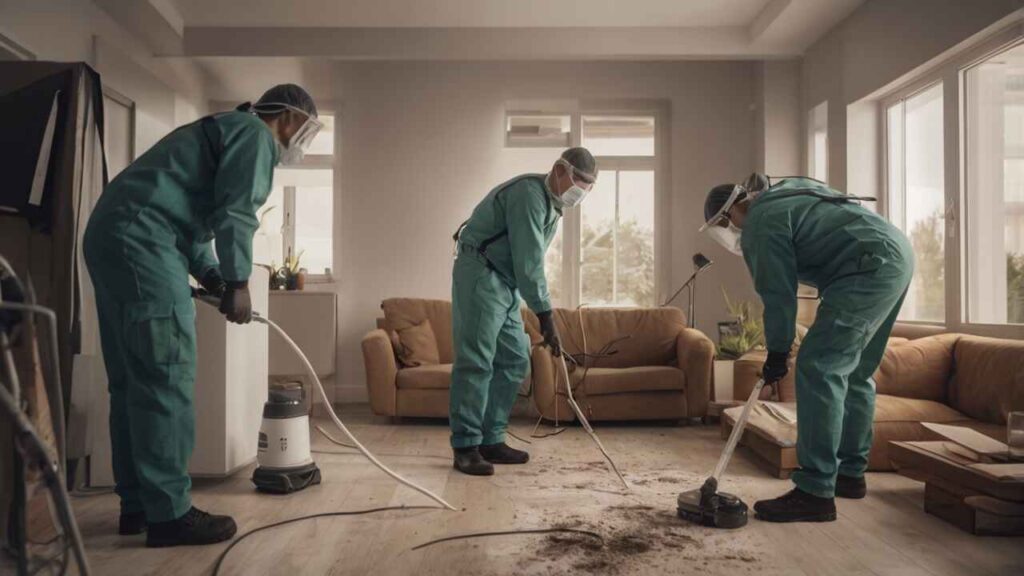There’s a point where those over-the-counter sprays, traps, and online DIY tips just don’t cut it anymore. Many homeowners in North Carolina learn this the hard way—after seeing ants come back, termites chew through wooden frames again, or hearing scratching noises behind the drywall late at night. It’s frustrating, right? What seems like a quick fix ends up being an endless, costly cycle.
The truth is, while DIY pest control may give that satisfying “quick result,” it often hides deeper infestations beneath the surface. The short-term wins of doing it yourself can’t compete with the long-term, safe, and comprehensive solutions offered by North Carolina’s trusted pest control experts.
Professionals don’t just spray and go—they inspect, assess, plan, and monitor. And that’s exactly what makes them worth every penny.
- Why DIY Pest Control Often Fails (Even If It Feels Like It’s Working)
- The Long-Term Value of Professional Pest Control in North Carolina
- Comparing the Cost: Property Damage vs. Pest Control Services
- What the Experts Say About Long-Term Pest Solutions
- City-by-City Challenges: Why Each Area Needs Different Strategies
- Beyond Bugs: The Overlooked Side of Pest Management
- Fighting the Stubborn Invaders: Cockroaches and Ants
- Repair and Prevention: The Final Step Most People Skip
- What Comes Next: Expanding Your Pest Knowledge
- FAQs
Why DIY Pest Control Often Fails (Even If It Feels Like It’s Working)
It’s understandable why many homeowners start with DIY. A $10 spray can looks way cheaper than a professional visit. But what’s rarely discussed is how pests adapt. Roaches, ants, and even mosquitoes build resistance to common sprays.
You might not realize it, but every time you spray that corner near the kitchen sink, you’re only killing the visible ones—not the colony hiding inside the walls. Same thing with rats: setting one trap won’t fix a nesting issue in the attic.
One local homeowner in Charlotte, Mark W., shared how he spent months battling what he thought was a small ant problem. “I used everything from vinegar spray to borax. It worked for a week, then they came back worse,” he said. When he finally called a professional pest control company, they found two separate colonies inside his kitchen wall and basement. Total cost for the DIY trial and error? Around $200. Actual professional treatment that solved it? $180, including a 6-month prevention plan.
So yes, sometimes trying to save money ends up costing more.
The Long-Term Value of Professional Pest Control in North Carolina
When you hire a trusted pest control expert, you’re not just paying for the treatment—you’re buying peace of mind. Most Wilmington pest control companies or Charlotte exterminators start with a detailed inspection. That means crawling into attics, checking foundation cracks, inspecting moisture-prone areas, and identifying even the smallest pest entry points.
Professionals use industrial-grade but safe chemicals that target pests precisely without harming pets or family members. More importantly, they create a customized pest management plan.
This often includes:
- Scheduled follow-ups every 3 to 6 months
- Preventive barriers and baits
- Repair of small structural vulnerabilities (like sealing crawl space gaps)
- Moisture control, which is critical for termite prevention
I’ve personally seen how much difference this makes. A friend’s property in Asheville was facing termite issues that DIY treatments couldn’t solve. The pros used baiting systems and installed moisture control vents—something no over-the-counter product could achieve. Two years later, not a single sign of re-infestation.
For a deeper dive into how professional services work, you can check out this resource: Expert Pest Control Companies in North Carolina. It breaks down how these services operate and what to look for when choosing a reliable exterminator.
Comparing the Cost: Property Damage vs. Pest Control Services
Let’s talk money for a moment. Many hesitate to hire professionals because they assume it’s expensive. But what’s really costly is the damage pests can cause. Termites alone cause billions in structural damage every year, and most homeowner insurances in NC don’t cover it.
Rodents chew through insulation and wires—sometimes triggering electrical fires. Cockroaches spread allergens and bacteria across surfaces. In short, the longer you wait, the more it costs later.
That’s why termite inspections are non-negotiable for NC homeowners. They’re not just a formality—they’re a critical defense line. Many Burlington pest control providers even bundle termite inspections with annual plans.
This isn’t about upselling—it’s about prevention. Because once you’ve seen how much it costs to replace floor beams or kitchen cabinets eaten from the inside, you’ll never look at that small inspection fee the same way again.
What the Experts Say About Long-Term Pest Solutions
According to Dr. Michael Hodges, a pest management specialist from Raleigh, “The main difference between DIY and professional pest control lies in root cause analysis. Homeowners treat symptoms. Professionals treat systems.”
That quote sticks with me. It’s exactly the gap between surface-level fixes and long-term stability. A professional knows that killing visible bugs isn’t enough; you must disrupt their breeding cycles, food access, and entry routes.
Professional teams use monitoring traps, moisture meters, and in some cases, thermal imaging cameras to detect hidden infestations behind walls. Tools like these ensure that North Carolina pest services deliver results that actually last.
City-by-City Challenges: Why Each Area Needs Different Strategies
Pest behavior in North Carolina varies by region. The humidity levels in Wilmington create perfect conditions for termites and mosquitoes. Meanwhile, Charlotte often struggles with urban pests like roaches and rats that thrive in densely populated areas. Asheville, surrounded by forested terrain, deals more with wildlife intrusion—raccoons, squirrels, and snakes sneaking into attics.
That’s why reading guides like A City-by-City Guide to Mosquito & Tick Control in North Carolina helps you understand these local nuances. A strategy that works for one region won’t necessarily work in another.
Professional exterminators in these cities are trained to tailor their methods—not just for the type of pest, but for the local climate, soil, and home structure too.
Beyond Bugs: The Overlooked Side of Pest Management
Pest control isn’t just about insects. Many homeowners underestimate how much rodent and wildlife exclusion matters. Tiny holes near a roofline or a loose vent screen can allow squirrels or mice to enter—and they breed fast. Once inside, they chew insulation and wires, causing hidden damage.
That’s where Essential Rodent & Wildlife Exclusion Strategies for NC Homes comes into play. Proper exclusion involves using heavy-gauge wire mesh, foam sealants, and even repairing soffits. Professional teams handle it all in one go—inspection, removal, and exclusion.
Fighting the Stubborn Invaders: Cockroaches and Ants
Nothing feels more hopeless than battling endless roaches or sugar ants in your kitchen. I once read an incredible guide titled Expert Tips for Eradicating Stubborn Cockroach and Ant Infestations in North Carolina. It’s brutally honest about how persistence matters—but also how professionals handle it with bait gels, growth regulators, and precision-spray tools.
Cockroaches don’t just live in dirty homes. They thrive anywhere with warmth, moisture, and food access. Professionals know exactly where to look—under fridge motors, behind dishwashers, and inside electrical outlets. And unlike DIY sprays that just scatter them, professional-grade products disrupt the breeding entirely.
Repair and Prevention: The Final Step Most People Skip
After a major infestation is controlled, most experts suggest light home repairs and sanitation updates. Cracks sealed, wood treated, drains cleared, and clutter minimized.
Some trusted pest control companies in NC even include light repair work as part of their premium plans. They patch entry points, install weather stripping, and provide education on storage habits.
One homeowner in Raleigh told me their pest control team found an unnoticed water leak under the sink—turns out it was attracting silverfish. Fixing that leak was what finally stopped the recurring issue. So sometimes pest control also leads to home improvement.
What Comes Next: Expanding Your Pest Knowledge
Once you understand the basics, there’s more to explore. Learning about seasonal pest behavior, eco-friendly pest control innovations, and the science of pest resistance can help you maintain a pest-free home year-round.
Topics like “how moisture control affects pest reproduction,” or “safe pest treatments for homes with pets,” are fascinating extensions of this discussion. You’ll probably see these areas covered more often on ProServiceTips.com and the broader Pest Control category.
These connected topics create a network of reliable, experience-driven insights—not just a one-off solution, but a growing library for North Carolina homeowners who want to stay ahead of infestations before they even start.
FAQs
1. How do I know when to call a professional pest control expert?
If you’ve been treating the same issue for weeks with no improvement—or the pests keep coming back—then it’s time to call a trusted exterminator. Persistent signs like droppings, chew marks, or recurring insect trails indicate a deeper issue.
2. Are professional pest control chemicals safe for pets and kids?
Yes. Licensed experts in NC use EPA-approved, pet-safe formulations and apply them strategically. Most treatments require minimal downtime before re-entry.
3. How often should pest control be done in North Carolina?
Typically, quarterly or bi-annual visits are ideal for ongoing protection. However, certain high-risk areas (like Wilmington’s coastal regions) may need more frequent monitoring due to moisture and termite risk.
If you’ve reached the point of spraying weekly just to see bugs return, it’s not a battle—it’s burnout. Let the professionals handle it. They bring experience, tools, and commitment that DIY simply can’t replicate.
So next time you’re tempted to grab that can again, pause for a second. The smarter move is a single call to a reliable North Carolina pest control expert who’s already solved hundreds of infestations just like yours.
And if you found this guide helpful, don’t forget to share it on your social media using the share buttons below—help a fellow NC homeowner finally stop spraying and start sleeping peacefully again.



